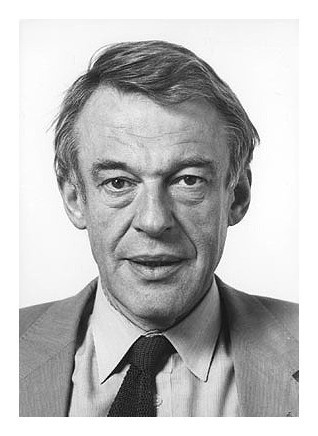
I just heard the news that Hans van Mierlo has died. Though most of y’all outside the Netherlands won’t know who he is, he was one of the most important figures in Dutch postwar politics, a towering giant admired both inside and outside of his own party. He was also a somewhat tragic figure, the founder of a party that was supposed to transform the Dutch political system, who saw his party make an end to the Christian Democratic domination of postwar governments, but also saw his party become part of the very same system it was founded to destroy. He was a decent man, a honest man, a politician you could respect though you disagreed with his politics, unlike most of his succesors in his party.
It all started back in 1966 when van Mierlo, together with some forty-odd other people concerned about the state of the Dutch democracy founded Democraten ’66, or D’66, later D66. The postwar consensus between the Liberal, Christian-Democrat and Social Democratic parties meant that voters had little or no influence on politics, with important decisions being made in smoky backrooms and paternalistic, elistist governments out of touch with the citizens. D66 was an attempt to break this system by providing a new kind of politics, outside the old traditions and wanting a complete remodeling of the Dutch political system. It was immediately succesful, winning seven seats in parliament in the elections the next year, at a time when such broad shifts were largely unknown. D66 paved the way for a whole wave of new parties in the sixties and seventies, forcing the older parties to respond or lose seats.
But the succes did not last. By the mid-seventies the party had almost died out, before revamping itself as a more properly liberal party, less orientated towards political transformation. Its fortunes waxed and waned over the decades, usually rising in opposition and falling again in government, with its zenith in 1994, when it won twentyfour seats and — for the first time since World War I– a government was formed without the Christian Democrats, the deadlock it had on Dutch politics finally broken. It meant that finally there was a political consensus for such liberal measures as gay marriage, long after the public consensus had reached this point.
And yet, this success didn’t last either. Since 1994 D66’s electoral fortunes have kept waning, with last elections being their worst ever, with only three seats in parliament, though polls have since then seen its fortunes rising again. What’s worse however is how little has remained of its ideals. From grand ideas to change the political system they degraded to a checklist of demands, to be traded in during coalition negotiations, finally to be discarded entirely for another shot at power. Perhaps the worst moment for D66 and van Mierlo may have been when Thom de Graaf, just resigned as minister in the then government because his plans to introduce elected mayors were torpedoed by parliament, buggered off to become an unelected mayor himself… It was symbolic for the shambles the party was in at the time and must’ve hurt van Mierlo somewhat.
Since then the party has once again resurrected itself as the voice of reasonable anti-Wilders voters, but any respect I used to have for them –I voted for van Mierlo in the 1994 elections, my first– has long been lost. But van Mierlo himself has never lost my respect, because he has always stayed true to his ideals even with all the trouble he has had realising them.